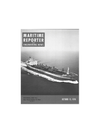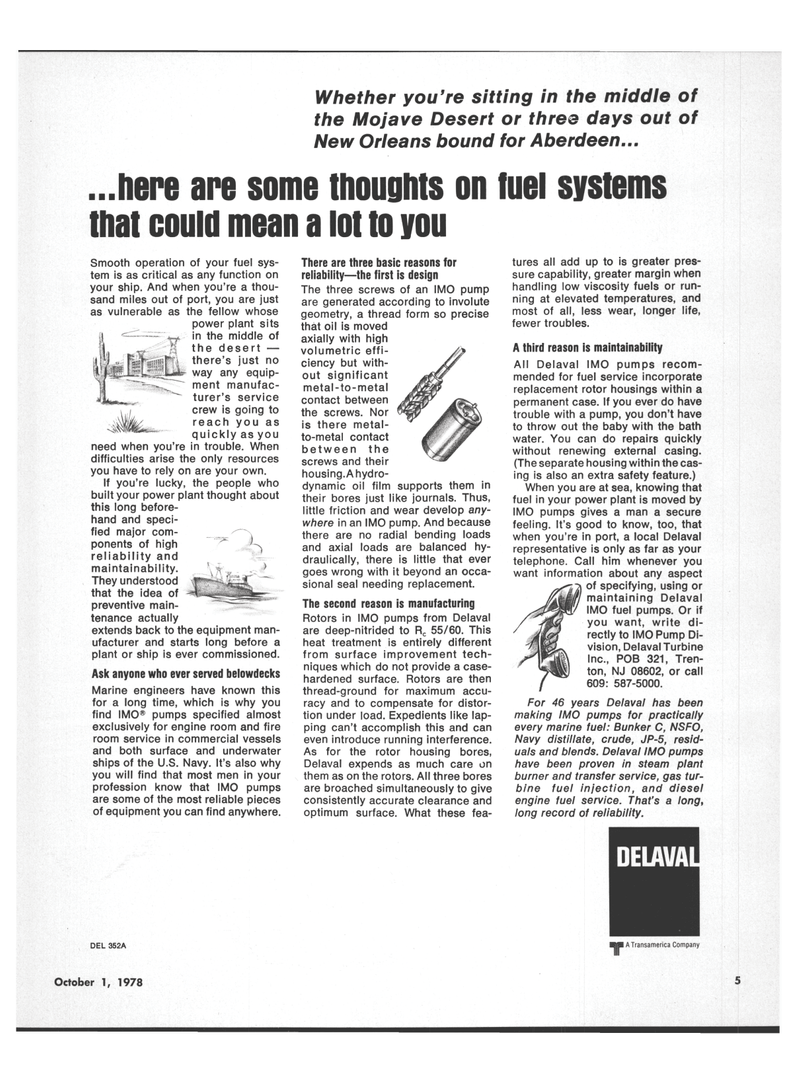
Page 3: of Maritime Reporter Magazine (October 1978)
Read this page in Pdf, Flash or Html5 edition of October 1978 Maritime Reporter Magazine
Whether you're sitting in the middle of the Mojave Desert or three days out of
New Orleans bound for Aberdeen... ...here are some thoughts on fuel systems that could mean a lot to you
Smooth operation of your fuel sys- tem is as critical as any function on your ship. And when you're a thou- sand miles out of port, you are just as vulnerable as the fellow whose power plant sits in the middle of the desert — there's just no way any equip- ment manufac- turer's service crew is going to reach you as quickly as you need when you're in trouble. When difficulties arise the only resources you have to rely on are your own.
If you're lucky, the people who built your power plant thought about this long before- hand and speci- fied major com- ponents of high reliability and maintainability.
They understood that the idea of preventive main- tenance actually extends back to the equipment man- ufacturer and starts long before a plant or ship is ever commissioned.
Ask anyone who ever served belowdecks
Marine engineers have known this for a long time, which is why you find IMO® pumps specified almost exclusively for engine room and fire room service in commercial vessels and both surface and underwater ships of the U.S. Navy. It's also why you will find that most men in your profession know that IMO pumps are some of the most reliable pieces of equipment you can find anywhere.
There are three basic reasons for reliability—the first is design
The three screws of an IMO pump are generated according to involute geometry, a thread form so precise that oil is moved axially with high volumetric effi- ciency but with- out significant metal-to-metal contact between the screws. Nor is there metal- to-metal contact between the screws and their housing. Ahydro- dynamic oil film supports them in their bores just like journals. Thus, little friction and wear develop any- where in an IMO pump. And because there are no radial bending loads and axial loads are balanced hy- draulically, there is little that ever goes wrong with it beyond an occa- sional seal needing replacement.
The second reason is manufacturing
Rotors in IMO pumps from Delaval are deep-nitrided to Rc 55/60. This heat treatment is entirely different from surface improvement tech- niques which do not provide a case- hardened surface. Rotors are then thread-ground for maximum accu- racy and to compensate for distor- tion under load. Expedients like lap- ping can't accomplish this and can even introduce running interference.
As for the rotor housing bores,
Delaval expends as much care on them as on the rotors. All three bores are broached simultaneously to give consistently accurate clearance and optimum surface. What these fea- tures all add up to is greater pres- sure capability, greater margin when handling low viscosity fuels or run- ning at elevated temperatures, and most of all, less wear, longer life, fewer troubles.
A third reason is maintainability
All Delaval IMO pumps recom- mended for fuel service incorporate replacement rotor housings within a permanent case. If you ever do have trouble with a pump, you don't have to throw out the baby with the bath water. You can do repairs quickly without renewing external casing. (The separate housing within the cas- ing is also an extra safety feature.)
When you are at sea, knowing that fuel in your power plant is moved by
IMO pumps gives a man a secure feeling. It's good to know, too, that when you're in port, a local Delaval representative is only as far as your telephone. Call him whenever you want information about any aspect of specifying, using or maintaining Delaval
IMO fuel pumps. Or if you want, write di- rectly to IMO Pump Di- vision, Delaval Turbine
Inc., POB 321, Tren- ton, NJ 08602, or call 609: 587-5000.
For 46 years Delaval has been making IMO pumps for practically every marine fuel: Bunker C, NSFO,
Navy distillate, crude, JP-5, resid- uals and blends. Delaval IMO pumps have been proven in steam plant burner and transfer service, gas tur- bine fuel injection, and diesel engine fuel service. That's a long, long record of reliability.
DEL 352A
October 1, 1978 5
ATransamerica Company

 2
2

 4
4
